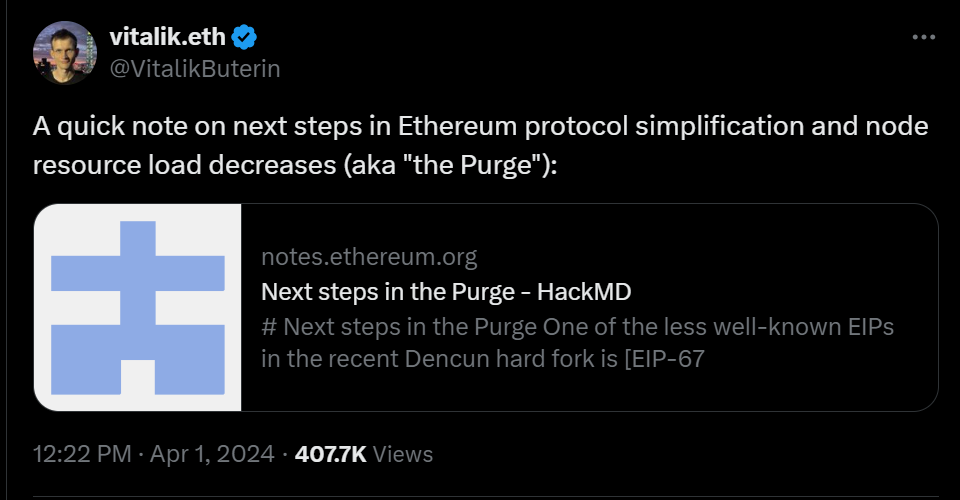Vitalik Buterin, the pioneering co-founder of Ethereum, has unveiled the next phase in the blockchain’s evolution, known as the Purge. This initiative aims to streamline the network’s architecture, enhancing usability while reducing the burden on nodes. A pivotal element of this phase is the enhancement of EIP-6780, introduced in the recent Dencun hard fork. This improvement, by refining the SELFDESTRUCT opcode, promises to bolster security and simplify protocol application. Buterin highlights the significance of such updates in making Ethereum more accessible and secure by eliminating redundancies and reinforcing security protocols.

Snap | Source: X (Formerly Twitter)
Further advancements include the resolution of the “empty accounts” dilemma via EIP-7523 and eliminating superfluous code in the Geth client post-merge, thereby simplifying network operations. Additionally, the Dencun update’s
Buterin also advocates for adopting precompilation techniques to streamline Ethereum contracts, enhancing the efficiency of applications reliant on ZK-SNARK technology. Building on Dencun’s success, he calls for internal network expansion and the parallel processing of roll-up transactions, leveraging the capabilities introduced by the Merge for improved transactional processes.
Towards Greater Decentralization
In pursuit of a more decentralized Ethereum ecosystem, Buterin proposes stricter penalties for large validators or staking pools that exhibit failures, aiming to curb the dominance of major stakeholders. This comes in response to concerns about the centralized operation of validator services, which could lead to correlated failures impacting the network’s integrity. By introducing a punitive system that escalates fines for simultaneous failures among validators likely operated by a single entity, Ethereum seeks to discourage the concentration of validation operations and promote a more distributed network structure.
This initiative is grounded in the observation that validators operating nearby or on shared infrastructure are at a higher risk of simultaneous failures. The proposed penalty mechanism, therefore, aims to deter large staking entities from operating multiple validators on shared resources, thereby fostering a more resilient and decentralized network.
Incremental Improvements Post-Dencun
Following the Dencun upgrade, Buterin envisions a future where Ethereum’s developments are more incremental, focusing on enhancing the ecosystem’s overall quality. The introduction of blobs has been a significant milestone, facilitating more efficient operations on Ethereum’s Layer 2 (L2) networks. Buterin emphasizes the need to shift focus towards improving L2 solutions, including the potential for data availability sampling to optimize data handling capabilities.
With the foundational changes by blobs, future scaling efforts will concentrate on refining L2 functionalities and expanding data capacity without requiring extensive hard forks. These efforts include optimizing transaction data sizes, reducing dependency on the base layer for security, and advancing the autonomy of L2 networks. Buterin advocates for the Ethereum community to develop protocols that meet contemporary standards, leveraging existing tools to create secure and user-friendly applications.
Furthermore, Buterin continues to champion initiatives to diversify Ethereum’s staking landscape, introducing “rainbow staking” concepts and enforcing stricter penalties for large staking entities. These proposals are designed to mitigate the influence of staking conglomerates, encouraging a more equitable and decentralized staking environment.
As Ethereum continues to evolve under Vitalik Buterin’s guidance, the focus remains on simplification, security enhancement, and the promotion of decentralization. Through strategic updates and a commitment to incremental improvement, Ethereum aims to refine its infrastructure, making it more accessible, efficient, and resistant to centralization. In embracing these changes, Ethereum anticipates a future of streamlined operations and expanded capabilities and reaffirms its dedication to a decentralized and equitable blockchain ecosystem.
 cryptonews.net
cryptonews.net